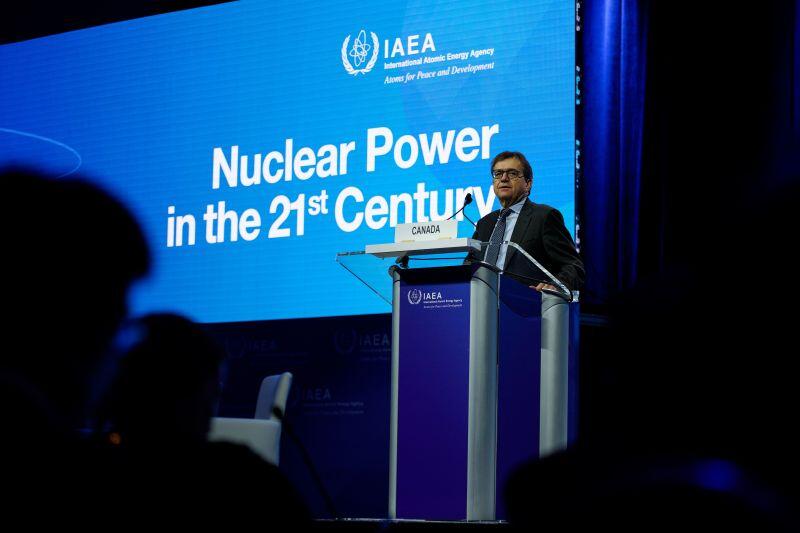
Canada’s National Statement on Nuclear Energy
The following statement was released by the Ministry of Natural Resources on 25 October 2022 on their website.
The Honourable Jonathan Wilkinson, Minister of Natural Resources, made the following statement at the International Atomic Energy Agency 5th Ministerial Conference on Nuclear Power:
Director General Grossi, member states. I am pleased to be here at the 5th Ministerial Conference on Nuclear Power, representing the Government of Canada in my capacity as Minister of Natural Resources.
Today, we meet at a pivotal moment in history. As you know, the effects of the war in Ukraine are having a significant impact in Europe and far beyond.
Because of Russia’s illegal invasion, energy affordability and security are now at the forefront of international affairs. This conflict has exposed the vulnerability of global energy markets and impacted the supply chains for many other key commodities and industries.
In the short term, Europe is looking to replace Russian energy imports with those from other countries while concurrently aggressively accelerating a transition toward non-emitting and more secure forms of energy, including renewables, hydrogen and nuclear.
But even before the events of the past several months, the global economy was changing and changing rapidly. Around the world, financial markets are increasingly pricing climate risk into investment decisions. Smart money is flowing from assets that are not compatible with a transition to a net-zero world and toward opportunities that are.
And the existential challenge of climate change and the current war in Ukraine have significant implications for nuclear energy.
Around the world, governments are looking for secure, non-emitting forms of energy to provide the power required to eliminate unabated coal and natural gas combustion and to provide the significant amount of incremental electricity that will be required if we are to achieve our climate goals. And nuclear energy is clearly one of these available options.
Countries that had not invested significantly in nuclear power for some time are now actively considering building new power plants and delaying the closure of existing ones.
As you know very well, nuclear power has many advantages: it is non-emitting; it is safe; it provides baseload power; and, when produced properly, it is affordable.
This is a space in which Canada can play an important role, namely to address domestic energy requirements and to export natural resources and technology to the world.
Canada began a legacy of nuclear excellence as the second country ever to produce nuclear power. Since that time, we have been actively involved in promoting the peaceful use of nuclear energy around the world.
Today, as a Tier-1 nuclear nation with over 70 years of technological leadership, a world-class regulator and a strong domestic supply chain, our nuclear sector is poised to be a leader in an emerging global market that some estimate to be worth up to $150 billion a year by 2040.
Thanks to Saskatchewan, Canada is home to the largest deposit of high-grade uranium on earth. And we produce over 70 percent of the world’s supply of cobalt-60, the most common isotope used in radiation therapy and medical equipment sterilization.
Around the world, nuclear power has helped avoid about 55 gigatonnes of CO2 emissions over the past 50 years — the equivalent of two years of global energy–related CO2 emissions. Today, as a reliable source of non-emitting energy, nuclear provides roughly 10 percent of the world’s electricity.
There is a real opportunity for Canada here — and we’re keen to seize it.
This applies to existing technologies as well as new technologies, like small nuclear reactors. I believe an important part of the future of nuclear power lies in SMRs. And as an early domestic adopter of SMRs, Canada could realize a significant share of the global exports of technology, goods and services.
The first Canadian SMR, a five-megawatt Micro Modular Reactor design, is set to be deployed in 2026 at the Canadian Nuclear Laboratories’ site at Chalk River, Ontario.
And, just yesterday, the Canada Infrastructure Bank announced a loan of $970 million to develop Canada’s first commercial SMR, a larger, 300-megawatt project that will come online at the Darlington generating station, also in Ontario, by 2028.
The federal government has been supporting SMR development with programs like the Strategic Innovation Fund, which invested $20 million to advance Ontario-based Terrestrial Energy’s reactor design. Through the same fund, we invested $50 million to help develop New Brunswick’s Moltex Energy’s reactor and technology to recycle CANDU spent nuclear fuel into new fuel. And we invested another $27 million in financing for Westinghouse Electric to help advance microreactors in Saskatchewan.
The recent federal budget provided further significant financial and policy support to develop and deploy SMRs, advance uranium exploration and spur nuclear supply chain opportunities. This support included $70 million in research to minimize waste generated from reactors; create a fuel supply chain; strengthen international nuclear cooperation agreements; and enhance domestic safety and security practices. And we are investing $50 million for the Canadian Nuclear Safety Commission to develop appropriate regulations for small modular reactors and to work with international partners on global regulatory harmonization.
All of these investments are in addition to the ongoing $1.2-billion revitalization of the federal Nuclear Laboratories at Chalk River.
The recent federal budget also expanded the role of Canada’s Infrastructure Bank, enabling it to invest in infrastructure projects that will accelerate Canada’s transition to a low-carbon economy, including through the use of small modular reactors.
Today, we’re seeing growing international interest in Canada’s nuclear industry from countries looking to pursue nuclear power as part of their energy security and climate objectives.
All of this activity and interest underlines the accelerating momentum in nuclear energy and highlights Canada’s desire to play a leadership role in this area.
As we go forward, it is critically important that like-minded nations come together to ensure a future that is sustainable. Nuclear energy must be part of such a sustainable future. And Canada is here to help make that happen.
Thank you, merci beaucoup.
Media Contact
Natalie CutlerVice President, Communications & Member Engagement
communications@cna.ca



